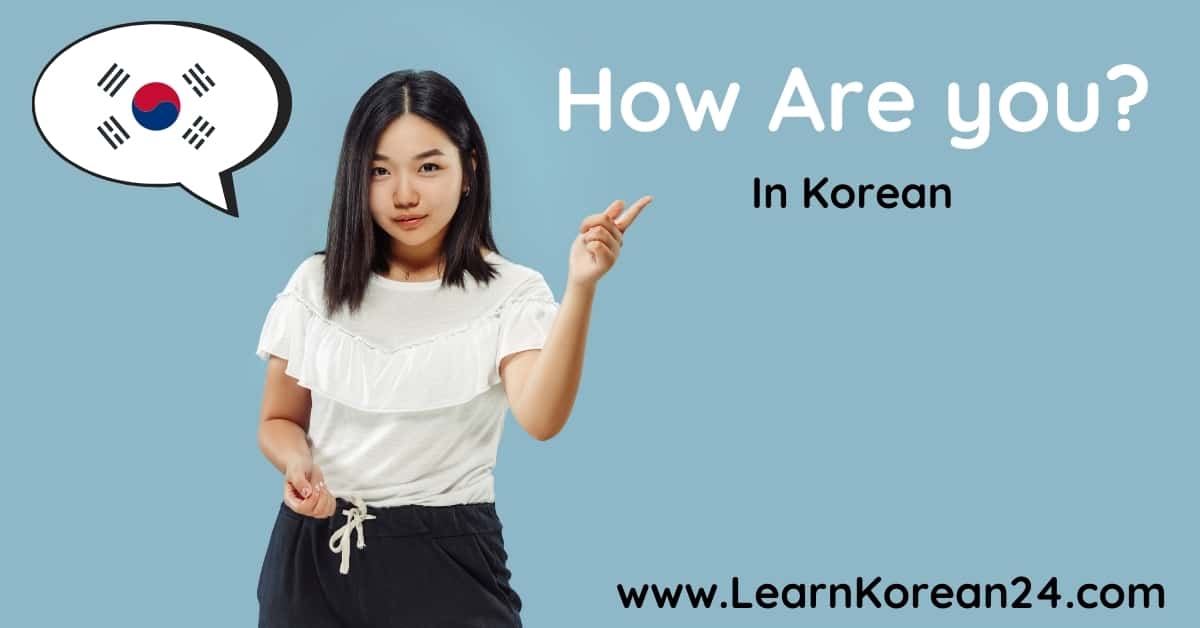How To Say “How Are You?” In Korean And How To Answer
If you have been studying Korean you may have noticed that there is no direct translation to ‘How are you?’ in Korean. In English, this is a common expression and is usually used to greet someone or simply to say hello in a polite way.
However, there is no direct translation to ‘How are you?’ in Korean. In fact, unlike in English, Korean people do not ask someone they don’t know ‘How are you?’. Rather, the expression equivalent to ‘How are you?’ in Korean is only used with people you know and haven’t seen in a while. So, how do you say ‘How are you?’ in Korean?
The closest translation to ‘How are you?’ in Korean is ‘잘 지냈어요?’. This is made up of the ‘잘’ which means ‘well’ and the verb ‘지내다’ which means ‘to live/stay in a certain state or condition’. So, ‘잘 지냈어요?’ literally means ‘Have you stayed well?’ / ‘Have you lived well?’. As you can see, it is not a direct translation of ‘How are you?’ in Korean, but this expression is used when you want to say ‘How are you?’ in Korean.
In this post, we will show you how to say ‘How are you?’ in Korean in the polite, formal, and informal ways, and how to answer when someone asks you ‘How are you?’ in Korean.
The Korean words in this post include both Korean and English characters. If you’ve not learned how to read Korean yet, then check out our complete Korean Alphabet Guide.
How Are You? In Korean
As was mentioned above, the most common way to say ‘How are you?’ in Korean is ‘잘 지냈어요?‘ and this means ‘Have you stayed well?’. As this expression is only used with people you know who you have not seen in a while, ‘잘 지냈어요?’ is actually closer to ‘How have you been?’ in English.
This way to say ‘How are you?’ in Korean has a few different forms depending on the politeness level you wish to use.
Informal Way To Say “How Are You?” In Korean

When speaking with people younger than you, and with close friends, you can use the informal way to say ‘How are you?’ in Korean.
잘 지냈어? (jal ji-nae-sseo?)
As you can see, 잘 지냈어? doesn’t end in 요 or any other polite ending, and so this way to say ‘How are you?’ in Korean can only be used when you are speaking informally. For most situations, it is probably best to use the normal, polite way.
Polite Way To Say “How Are You?” In Korean

In most situations, when you want to ask someone you have not seen in a while ‘How are you?’ in Korean, it is best to use the polite way.
잘 지냈어요? (jal ji-nae-sseo-yo?)
As you can see, 잘 지냈어요? is the same as the informal way with 요 added to the end. This 요 makes this expression polite, and so you can use with people younger and older than you, and people you are not very close with.
Next, let’s look at the formal way.
Formal Way To Say “How Are You?” In Korean

When you want to ask ‘How are you?’ to someone who is older, in a higher social position than you, or someone you want to show a lot of respect to, you should use the formal way.
잘 지내셨어요? (jal jin-nae-syeo-sseo-yo?)
This way to say ‘How are you?’ in Korean uses a formal ending and so you can use this in situations when you want to show a high level of respect. For example, imagine you are meeting your girlfriend’s parents after not seeing them for a while. When you meet, you can say ‘잘 지내셨어요?’ to ask ‘How are you?’ in a formal and respectful way.
How To Answer ‘How Are You?’ In Korean
Now that you know how to say ‘How are you?’ in Korean, you are probably wondering how to answer this question. Here are some common ways to answer when somebody asks you ‘잘 지냈어요?’:
- 네. 잘 지냈어요. = Yes. I have been well.
- 너무 잘 지냈어요. = I’ve been very well.
- 아주 잘 지냈어요. = I’ve been very well.
- 잘 못 지냈어요. = I’ve not been well.
- 바쁘게 지냈어요. = I’ve been busy. (lit I’ve been living busily)
- 덕분에 잘 지냈습니다. = I’ve been good thanks to you.
- 그냥 그래요. = So, so.
- 요새 너무 힘들어요. = It’s so hard these days.
- 요새 몸이 좀 안 좋아요. = I’m not feeling well these days.
- 요새 행복해 죽겠어요. = I’m so happy these days.
More Ways To Ask ‘How Are You?’ In Korean
Here are some other similar expressions you can use when you want to ask ‘How are you?’ in Korean.
- 어떻게 지냈어? = How have you been? (Informal)
- 어떻게 지냈어요? = How have you been? (Polite)
- 어떻게 지내셨어요? = How have you been? (formal)
- 밥 먹었어? = Have you eaten? (informal – This is used as a greeting in Korean.)
- 밥 먹었어요? = Have you eaten? (polite)
- 식사하셨어요? = Have you eaten? (formal)
- 요새 별일 없지? = Nothing special these days, right? (informal)
- 요새 별일 없죠? = Nothing special these days, right? (polite)
- 요새 별일 없으시죠? = Nothing special these days, right? (formal)


